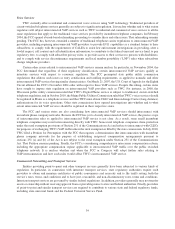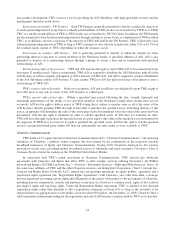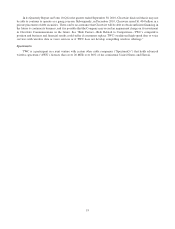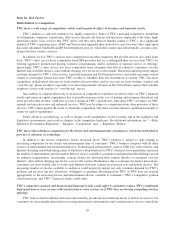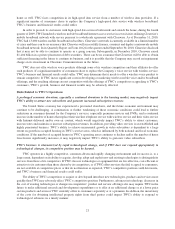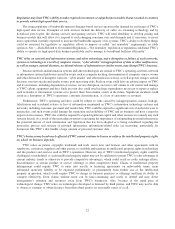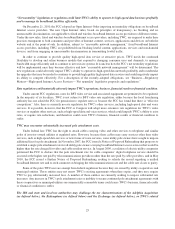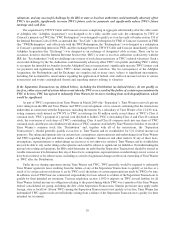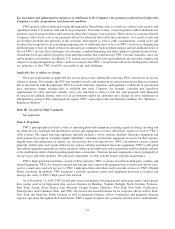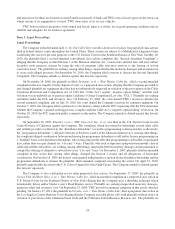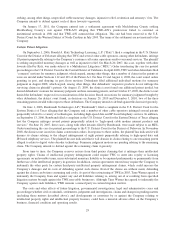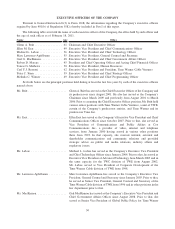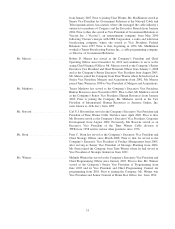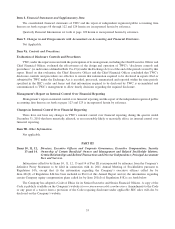Time Warner Cable 2010 Annual Report Download - page 36
Download and view the complete annual report
Please find page 36 of the 2010 Time Warner Cable annual report below. You can navigate through the pages in the report by either clicking on the pages listed below, or by using the keyword search tool below to find specific information within the annual report.have, either through contract or as a result of intellectual property rights, a position of some exclusivity. If demand exceeds
these vendors’ capacity, they experience operating or financial difficulties, they significantly increase the amount TWC
pays for necessary products or services, or they cease production of any necessary product due to lack of demand, TWC’s
ability to provide some services may be materially adversely affected. Any of these events could materially and adversely
affect TWC’s ability to retain and attract subscribers, and have a material negative impact on TWC’s operations, business,
financial results and financial condition.
TWC has multi-year agreements with Sprint under which it provides certain functions and services necessary to
TWC in providing Digital Phone service to customers by routing voice traffic to and from destinations outside of TWC’s
network via the public switched telephone network, delivering E911, operator and directory assistance service and
assisting in order processing, local number portability and long-distance traffic carriage. In the fourth quarter of 2010,
TWC began replacing Sprint as the provider of these services. However, the migration will not be complete until the first
quarter of 2014, during which time TWC’s reliance on Sprint for these services may render TWC vulnerable to service
disruptions and other operational difficulties, which could have an adverse effect on TWC’s business and financial results.
Risks Related to Government Regulation
TWC’s business is subject to extensive governmental regulation, which could adversely affect its business.
TWC’s video and voice services are subject to extensive regulation at the federal, state and local levels. In addition,
the federal government has extended some regulation to high-speed data services. TWC is also subject to regulation of its
video services relating to rates, equipment, technologies, programming, levels and types of services, taxes and other
charges. Modification to existing regulations or the imposition of new regulations could have an adverse impact on
TWC’s services. TWC expects that legislative enactments, court actions, and regulatory proceedings will continue to
clarify and, in some cases, change the rights of cable companies and other entities providing video, high-speed data and
voice services under the Communications Act and other laws, possibly in ways that TWC has not foreseen. The results of
these legislative, judicial and administrative actions may materially affect TWC’s business operations.
Changes in broadcast carriage regulations could impose significant additional costs on TWC.
Although TWC would likely choose to carry the majority of primary feeds of full power stations voluntarily,
so-called “must carry” rules require TWC to carry some local broadcast television signals on some of its cable systems
that it might not otherwise carry. If the FCC seeks to revise or expand the “must carry” rules, such as to require carriage of
multicast streams, TWC would be forced to carry video programming that it would not otherwise carry and potentially
drop other, more popular programming in order to free capacity for the required programming, which could make TWC
less competitive. Moreover, if the FCC adopts rules that are not competitively neutral, cable operators could be placed at a
disadvantage versus other multi-channel video providers.
Under the program carriage rules, TWC could be compelled to carry programming services that it would not otherwise
carry.
The Communications Act and the FCC’s “program carriage” rules restrict cable operators and MVPDs from
unreasonably restraining the ability of an unaffiliated programming vendor to compete fairly by discriminating against the
programming vendor on the basis of its non-affiliation in the selection, terms or conditions for carriage. The FCC’s
Adelphia/Comcast Transactions Order imposes certain additional obligations related to these rules. Under a successful
program carriage complaint, TWC might be compelled to carry programming services it would not otherwise carry and/or
to do so on economic and other terms that it would not accept absent such compulsion. TWC is currently the defendant in a
program carriage complaint. See “Business—Regulatory Matters—Video Services—Program access and Adelphia/
Comcast Transactions Order.” Compelled government carriage could reduce TWC’s ability to carry other, more desirable
programming and non-video services, decrease its ability to manage its bandwidth efficiently and increase TWC’s costs,
adversely affecting TWC’s competitive position.
24




